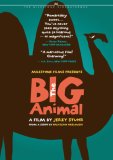| Reviews & Columns |
|
Reviews DVD TV on DVD Blu-ray 4K UHD International DVDs In Theaters Reviews by Studio Video Games Features Collector Series DVDs Easter Egg Database Interviews DVD Talk Radio Feature Articles Columns Anime Talk DVD Savant Horror DVDs The M.O.D. Squad Art House HD Talk Silent DVD
|
DVD Talk Forum |
|
|
| Resources |
|
DVD Price Search Customer Service #'s RCE Info Links |
|
Columns
|
|
|
Big Animal (Duze Zwierze), The
The movie is a little masterpiece, a deadpan comedy-drama, shot in black and white, that, if you didn't know better, you'd think was some overlooked gem from the 1960s new wave of Central European cinema -- right up there with such classic sociopolitical critiques as Milos Forman's "Loves of a Blonde" and Jiri Menzel's "Closely Watched Trains."
Stuhr stars as Zygmunt Sawicki, a chubby, proud clarinetist with his village's small orchestra. One evening as he and his wife (Anna Dymna) are eating dinner, a tall, two-humped camel wanders into their yard. The furry beast has been left behind by a traveling circus, and Sawicki adopts it. He walks it regularly through the village square, eliciting catcalls from the amused townfolk, adoration from children, offers from men who want to rent the beast out for photos or rides, but mostly suspicion from the authorities. As Sawicki tries to register the animal and pay whatever taxes are required on it, he repeatedly runs into bureaucratic obstacles. While the situation is not quite Kafkaesque, things get very uncomfortable for the Sawickis, to the point where the neighbors demand that they get rid of the camel.
And no movie animal since the donkey in Robert Bresson's "Au hasard Balthazar" is less deserving of scorn and abuse. Exuding utter calm, making hardly a sound, and ambling along wherever its master leads it, the camel is more civilized than most of the people in the film. It's not a stretch to say its demeanor is meant to mirror the steadfastness of peoples living under less than congenial governments. The creature "performs" magnificently, and what Stuhr says in an interview on the disc is true: every child who sees this movie will want a camel.
The movie, which would surely be rated G, is indeed that rare foreign film that kids will have no trouble watching. Stuhr films simply and clearly, with meaning to be found both on the surface and beneath it. A brilliant shot (laid out in the screenplay?) deserves special notice: as Mr. and Mrs. Sawicki stand in their garage-cum-stable, staring out from its two small windows at their angry neighbors, the camel peers from behind its owners, moving from one narrow window to the other, then back. Strict auteurist critics, who place the director above all others in the filmmaking heirarchy, may need to rethink their philosophies a bit in dealing with "The Big Animal." Can director Stuhr really be considered the author of a film that so clearly says "Kieslowski"?
THE DVD
Picture and sound
Specialty label Milestone has put out a wonderful disc. The black-and-white movie was shot mostly during overcast or damp weather, the low natural light resulting in beautifully contrasting shades of black and gray. The full-screen 1.33:1 aspect ratio adds to the 1960s verisimilitude. The Polish soundtrack is in Dolby Digital stereo, and the subitles are bright and clear.
Extras
The central bonus here is a half-hour Polish TV interview with Jerzy Stuhr, a huge but humble star in his native land. He talks of his collaborations with Krzysztof Kieslowski (they made "Camera Buff," "Decalogue" and "White" together, among others), elaborates on the wide-ranging aspect of a good Polish university education, and contends that his most important work has been as a teacher.
There's also a trailer and a six-minute making-of featurette produced for Polish audiences.
FINAL THOUGHTS
Krzysztof Kieslowski tackled the big questions in such mighty works as "The Decalogue," "Three Colors" and "The Double Life of Veronique," but he also was adept at the astute little comedy, which is where the posthumously produced "The Big Animal" can be placed. Star Jerzy Stuhr directs splendidly, perhaps with the spirit of Kieslowski looking over his shoulder into the viewfinder. Every shot counts in this tale of a man and his camel, every moment is the perfect moment.
|
| Popular Reviews |
| Sponsored Links |
|
|
| Sponsored Links |
|
|
| Release List | Reviews | Shop | Newsletter | Forum | DVD Giveaways | Blu-Ray | Advertise |
|
Copyright 2024 DVDTalk.com All Rights Reserved. Legal Info, Privacy Policy, Terms of Use,
Manage Preferences,
Your Privacy Choices | |||||||












